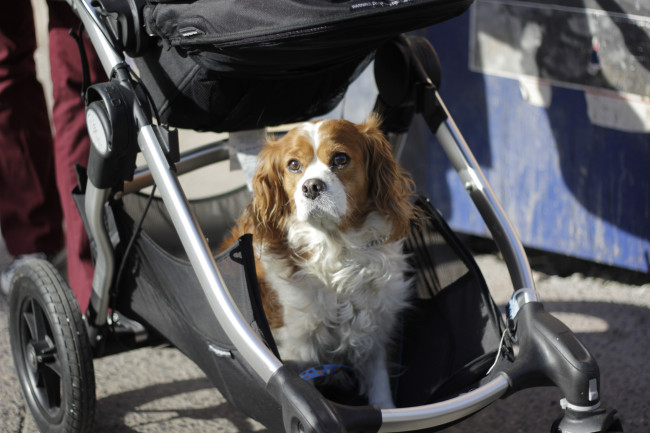How to pet-proof your NYC apartment
Adopting a dog or cat can bring joy into your life like few other things, but along with an animal's love and companionship can also come chewed wires, clawed furniture, and dangerous mishaps.
Just as you would take steps to protect a baby from potential home hazards (and your stuff from the baby), you'll need to give your New York apartment some pet-proofing before you bring in your new furry friend. Here's what to be mindful of, and a few helpful apartment tweaks to protect your place and your pet:
Prep the pet for its new home
The transition from an animal shelter or another apartment to your place may be jarring for your new pet, but there are steps you can take to help animals remain calm.
"Move them in on a day when you have time to be with the animal, when you're not stressed and not going back to work," says Donna Bradbury, an agent with Corcoran who specializes in pet-friendly rentals and sales. "That way, you have time to give the animal the opportunity to recognize you're there with them and having a relationship with them."
With that in mind, you may want to set adoption day for a weekend, so you have time to guide your pet to its water and food bowls, bed, and litter box, and be there as it acclimates to the new space. Using the same food or litter that the pet already knows from its previous home can help smooth the transition.
You should purchase pet supplies in advance, says Lori Bierbrier, medical director of the American Society for the Prevention of Cruelty to Animals community medicine department.
"For cats, this includes a collar, litter and litter box, food, and bowls. For dogs, this includes a leash, collar or harness, bed, food, and bowls," she says. "For training purposes, an appropriately sized dog crate is also often useful."
Also consider your building beyond the apartment, and familiarize your pet with its particular layout, sounds, and smells.
"If you're right by the elevator or where the trash goes down, those are all going to be new noises to them," Bradbury says. "Walk them around the building and get them used to what it's like."
Prep your place
Clear away wires
Make sure that electronic wires, computer and phone chargers, and extension cords are out of reach of paws and teeth. (HuffPost has a few suggestions for consolidating and concealing cords.)
Remove toxic plants
A number of common houseplants, including aloe, are toxic to animals if they chew on them, and others can cause stomach upset, so you'll want to get rid of them or move them out of reach, Bierbrier says. Remember that what's out of reach is different for dogs than it is for agile, climbing cats. For a full rundown, check out the ASPCA's list of plants that may be toxic to pets here.
Keep your windows safe for curious cats
Avoid High Rise Syndrome—a relatively common phenomenon in New York in which cats, unable to gauge how far they are from the ground, leap from apartment windows—by either keeping your windows closed, or installing screens the cat can't push out.
"Remember that cats can squeeze into smaller spaces than you might expect, so you shouldn’t rely on half closing the window to keep your cat safe," Bierbrier says.
Move toxic products out of reach
Put harsh cleaning products in a closed cabinet that pets can't get into, or on a high shelf out of reach.
Protect your belongings from pet damage
It's simply in a dog's nature to gnaw, and in a cat's to scratch, but you can try to divert their chewing and clawing away from your furniture and possessions. Keep dogs busy with chew toys and bones, and cats with scratching posts. In the latter case, Bierbrier says, you can make the posts more appealing by sprinkling them with catnip.
Putting double-sided, easily removable tape on a part of the couch that the cat loves to scratch is another possible deterrent, as is spraying the furniture with Febreeze or some sort of citrus scent, which cats find unpleasant. Given the choice, a cat will take the catnip-laden scratching post any day, as Lifehacker writes.
Declawing cats is now widely frowned upon, as it can be physically and psychologically damaging to cats, but you can and should keep your cat's claws trimmed. Bierbrier recommends getting your cat accustomed to regular manicures by beginning when it's a kitten.
"Rub your hand up and down the leg and then gently press each individual toe, giving her lots of praise and treats," she says. "Within a week or two of this daily foot massage, your cat should feel more comfortable with a nail trim."
For puppies who are not yet fully house-trained, you might invest in some baby gates to limit potential accidents to small, easy-to-clean spaces (ideally, outfitted with a couple wee-wee pads). You can also stop pets from busting into rooms you'd rather keep fur and hairball-free with handle locks.
Be mindful about pest control
Rodents and bugs are an unfortunate fact of life in New York apartments, and the measures we take to get rid of them can be harmful to pets. Give your place a once-over and make sure there aren't any potentially hazardous traps lying around before your pet moves in. If an exterminator visits your building regularly, find out what products he or she uses before letting him or her in to spray.
If you need pest control treatment, it may be as simple as moving your pet to another room while the exterminator works, but you might also have to take the pet out of your home entirely for a few hours.
"Do your own research, rather than taking another’s word that the products are 'pet safe,'" Bierbrier says.
Keep your pet healthy and happy while you're away
Just as important as your pet's physical health is its emotional health, and if you're away from your apartment for long stretches, you'll want to take steps so that your pet is fed, walked, and provided with some human company.
Bradbury says dog owners who work should seriously consider hiring a dog walker.
"A dog needs to go out at least once during the day. A lot of people walk their dog at 7 or 8 a.m. and come back at 6 p.m., and the dog has been in house all day," she says. "If you get caught on the train, that's a long time for a dog to wait."
Cats are lower maintenance in this sense, but an automatic feeder or water fountain can be a good idea if you work long hours.
If you're really devoted to spending loads of time with your animal companion, find out if your workplace allows animal visitors. Employees who have their pets nearby are more productive, the New York Post reports, and, according to Entrepreneur magazine, shop dogs are good for business.
You Might Also Like




























